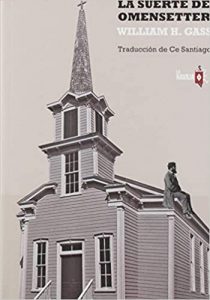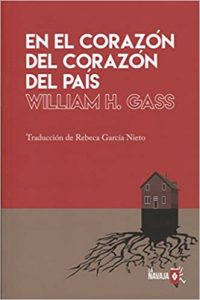Literature is full of great authors who remained in the second line for the average reader. I am referring to that standard reader that we all are, saturated with best-sellers, unspeakable biographies of inconsequential myths or, on the contrary, super-sophisticated books that are not always enjoyed without some snoozing in between (which Joyce y Kafka forgive me).
It is also true that in the end everything is a matter of taste. But in that final choice there are a lot of opportunities offered to one or the other. And there the marketing skills of each end up assuming essential tools.
It is not a question of shaking the foundations of literature. But it is fair to recognize that, that as many geniuses arrive as many others remain in popular obscurantism. In fact, it is always curious to find that posthumous discovery of the fascinating writer. What happen? Wasn't he also a good writer before?
But going back to William H Gass (or starting because I think he had not even cited it in his own post yet), in this American author we find the award-winning author, officially recognized and revered by many great authors such as Susan Sontag o Foster Wallace, but muted God knows why in that other commercial significance.
And his work is filled with great novels and stories, perhaps too localized, focused on some idiosyncrasies very much from there, from the deep USA, but in the end overflowing with humanity and that beautiful existentialism outlined by the great storytellers. Bold and stark existentialism. Like a sometimes melancholic lyric that addresses in detail, but without ambiguity, what we all harbor inside in those other books that everyone writes for themselves.
Top 3 Recommended Books by Wiliam H. Gass
Omensetter's luck
At the end of the XNUMXth century, the town of Gilean, in the state of Ohio, received a family of strangers, the Omensetters. From the first moment, its inhabitants admire the magnetic personality of the head of the family, Brackett, and the luck that always seems to accompany him. However, his arrival is not well received by everyone. Reverend Jethro Furber, in the process of mental and spiritual degradation, centers his hatred on Brackett Omensetter.
The dispute between the two spreads throughout the town, positioning it, festering based on those ancestral hatreds that move more than love, especially when love has been leaving a place for years, in almost all cases...
The various irregular foci between protagonists and complementary characters play in favor of a certain premeditated confusion towards a reading that borders on the schizophrenic between impressions and truth. Because in the end there is no truth and everything exists according to what is said or what is believed to have been said. A very interesting reading exercise, complex but always enriching. The writer himself or rather the voice that takes us into the plot participates and invites us to participate in the unsettling life that moves vitiatedly in a place as strange as it is close.
In the heart of the heart of the country
After its publication in 1968, In the Heart of the Heart of the Country became a classic of American literature and has maintained a certain aura of a cult book, a set of stories that at the same time is heir to the prose of Faulkner and Gertrude Stein's modernism, and that renews the narrative of her country along with the work of authors such as Donald Barthelme, William Gaddis, John Barth and Robert Coover.
The two short novels and three short stories that make up In the Heart of the Country are set in the Midwest and provide a powerful, mythic image of the deepest, most real America. They talk about violence, loneliness, a special relationship with nature, and, above all, the fragility of the human being and the relationships that he establishes with his environment.
Gass explores and expands the limits of the story, plays with words and twists them to reach dimensions hitherto unknown in literature. His work has been revered by writers such as David Foster Wallace and Cynthia Ozick.
About the blue
The notion of what exists, of reality, of the composition of a limited place that our condition imposes on us. Those ideas moved the author in his fictional space. And in this non-fiction work the issue takes on a more intellectual, even more philosophical level.
This essay by William Gass, considered one of the most original of the XNUMXth century, starts from a question that we have all asked ourselves on occasion: is it the color that seems to be out there and that I see in my mind -for example, blue? - the same one that others see?
To answer this question, the author takes us through the 'land of blue' among blue objects, living beings, expressions and feelings - or those that are recognized as blue even if they are not. Because blue is not just a color, it is a word that colors everything it touches. Among the Anglo-Saxons, sex is blue, to which Gass dedicates much of this essay, and to the often clumsy treatment of it in literature.
The problem is that the words 'are not loved enough', and it will only be possible to extract the essence of sex - its blueness - by using them properly. To exemplify this, Gass uses texts by authors as diverse as Virginia Woolf, Henry Miller, William Shakespeare and Colette.



